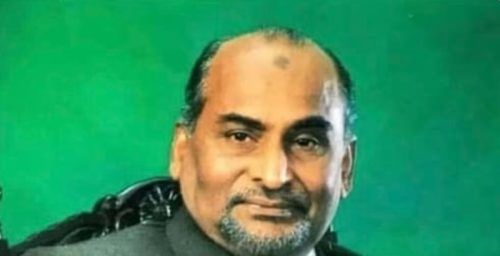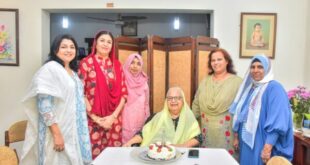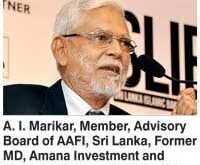 Cegu Issadeen An intelIectual heavyweight passed away in Akkaraipattu the other day. He was a multi-faceted personality. A controversial politician and an emotive speaker, he strode the literary and political fields in the South-East of Sri Lanka for several decades.
Cegu Issadeen An intelIectual heavyweight passed away in Akkaraipattu the other day. He was a multi-faceted personality. A controversial politician and an emotive speaker, he strode the literary and political fields in the South-East of Sri Lanka for several decades.
Late Issadeen was famous for his philosophical poetry in Tamil, writing under pen name, வேதாந்தி. He was the ideologue of Sri Lanka Muslim Congress in its early years, and its sworn nemesis later.
He was an outstanding poet who wrote in simple language conveying deeper meanings of life, and offering different aspects of human experience and insights. His poems are refreshingly distinct in their depth, use of imagery, and thrust. Some of them have musical effects, but do not have fixed pattern.
The best thing about his poetry, in sum, is its ability to resonate with the inner mind of the discerning reader while also appealing to a larger audience in a different milieu.
I remember having met Late Issadeen almost 40 years ago in the company of a few friends who were then working to establish a new political movement for the community. That was only a very brief meet. He then talked about முஸ்லிம் தேசியம். It was more of an emotional than intellectual discourse. My friends were inspired, though.
Elected on the SLMC ticket to the then-merged North-Eastern Province in 1988, he served as its first and only Opposition Leader until it was prematurely dissolved.
In 1992/3, the SLMC Leader Late Ashraff, speaking at a public meeting at Addalaichenai, proclaimed that he and his party would continue to support the then President of Sri Lanka as long as the latter remained in politics. Infuriated by these remarks, Late Issadeen challenged Ashraff openly for having taken that position without consulting the Party’s High Command.
In return, Ashraff expelled Issadeen from his party and then publicly declared that it was not in Issadeen’s Nase’b (fate) that he would ever become a Member of Parliament.
Time, nevertheless, proved otherwise. Issadeen was made a national list MP by the UNP in subsequent years. This led to Ashraff making Athaullah, his loyal supporter from Akkaraipattu, the Member of Parliament filling the vacancy that arose following Ashraf’s resignation from Parliament.
The whole story that ensued was a twist of irony. Not many are now talking about this split and the loss of strategic leadership that the political movement suffered subsequently.
Starting his occupation as a teacher of English trained in Palaly Teachers’ College, he entered the Law College in the 1970s and became a lawyer. He was not known to have practised law, though. He was married to a teacher from Jaffna, who was a prolific writer.
In his twilight years, Late Issadeen began meditating in a place on a hill rock off Akkaraipattu. Many people used to visit him and benefited from his wisdom. He was often approached by uncanny politicians to support them during election times. More of his visitors, however, were young people who were willing to hear him on his work of poetry, philosophical thoughts, and spirituality.
Some people were captivated by his enigmatic exposition of முஸ்லிம் தேசியம். There are several comments in the social media from those who were associated with him praising him for the wisdom and insights he shared. That is something extraordinary about a Muslim public figure in today’s standards, and it would hardly come by unless they were not genuinely affected by him.
On முஸ்லிம் தேசியம் however, in my humble view, he was neither one of its propounders nor a consistent promoter. He was originally passionate about a political movement but ended up promoting a party.
His idea of a political movement was based on his own experience in his early years of life that saw him being part of a group of youths in Akkaraipattu who fought for the rights of dispossessed farmers. That was the time when farmlands were encroached upon by outsiders who settled in the region with political backing.
His self-claimed leadership in making SLMC contest the North-Eastern Provincial Council Election in 1988 “with a view to demonstrating Muslims’ separate political identity and nationality” and the effect it had on the perception of Muslim community by others still remains open to scrutiny. It was a flawed election, and the SLMC participation gave it a facade of legitimacy.
In as much as they came under threats from the LTTE, the so-called torchbearers of முஸ்லிம் தேசியம் also enjoyed perks and privileges as a result of their bolstering of the externally propped-up Provincial Council.
Moreover, there was a hiatus between the ideas propogated and the means adopted to advance and assert முஸ்லிம் தேசியம். The peocesses and the political trajectory that followed, proved antithetical to perceived Muslim interests as well as its relationships with other segments of the wider Sri Lankan society. That topic remains yet to be seriously explored either academically or through a genuine community-reckoning to date.
This aside, Late Issadeen was undoubtedly a thought leader. He had the courage of conviction which never dissipated with the passage of time.
May Allah SWT grant him Jannathul Firthous. Aameen.
Post Disclaimer | Support Us
Support Us
The sailanmuslim.com web site entirely supported by individual donors and well wishers. If you regularly visit this site and wish to show your appreciation, or if you wish to see further development of sailanmuslim.com, please donate us
IMPORTANT : All content hosted on sailanmuslim.com is solely for non-commercial purposes and with the permission of original copyright holders. Any other use of the hosted content, such as for financial gain, requires express approval from the copyright owners.
 Sri lanka Muslims Web Portal Sri Lanka Muslims News Center
Sri lanka Muslims Web Portal Sri Lanka Muslims News Center
 Donate
Donate


